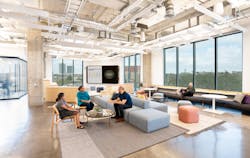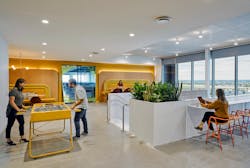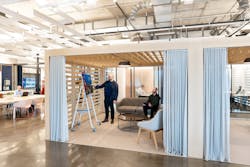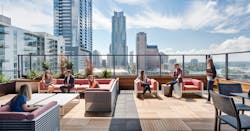Collaboration in the Workplace and the Design Elements That Support It
A big driver for most in their return to office journey is of course the ability to come together again. And while meetings might not look the same as what we remember, today’s products are allowing us to make more meaningful connections and have better brain-storming sessions than ever before by offering an unprecedented ease-of-use.
Here we’ll break down some of the most popular ways we’re seeing workers come together, and what design elements are essential to support them.
The Traveling Band
Clients will be demanding semi-enclosed yet movable and coordinated mini offices that can accommodate a handful of in-person participants and can go up to the same for virtual participants but more than likely only 1-2 given space constraints and a growing emphasis on digital equality. This grouping will have screens, of course, white boards and upholstered partitions for pin-ups and acoustical privacy; seating will be benching and/or stools as it’s not meant for longer, more open-ended collaboration (think a two-hour rehearsal). Check out Teknion’s Kiosk, a collection of freestanding modules that define work hubs and distribute collaborative tools across the office.
The CIA Operative
“Depending on the level of security needed, this 1:1, virtual to in-person employee meeting can require a complete separation from their surroundings with a phone booth or can also be accommodated with a lounge or soft seating option with a high-back enclosure. See Libelle from Studio TK, a functional, yet whimsical, collection of seating options.
Whereas phone booths always provided the proper acoustics and some storage or table options for these private talks, they are now being outfitted with the proper technology, lighting and spacing to accommodate a more in-depth conferencing.
The Traditionalist
The “meeting room” isn’t going anywhere, but it does need to update its haircut. The Traditionalist can easily become The Modernist by recognizing the importance of digital equity for virtual participants in any type of collaboration. Bonnie Reese, experience strategy director at Gensler says best-in-class technology, thoughtful placement of microphones (overhead), cameras (above the screen), and furniture (within the frame of the camera) are essential. “It is also key to support and nudge new behaviors: gentle in-room reminders when people joining virtually cannot see or hear what’s going on in the room; alerts when someone on screen has their ‘hand raised,’ and methods for engagement that foster participation from remote colleagues,” she said.
The Coffee House
Designers are merging collaboration spaces with amenities to not only offer more multi-use functionality, but also create a co-working atmosphere similar to that found in a hotel lobby. This can include a coffee (or any type of) bar, outdoor space or even a broadcasting or amphitheater—all with easy to operate technology capabilities where workers can gather together or separately. Products like BuzziCocoon can help achieve the latter—maintaining the buzz that energizes people while together but still offering privacy.
The VIP
“Blur the boundaries between workstyles. Integrating lounge areas within traditional work settings allows for teams to shift focus if needed.” —Vince Flickinger
This is the party you really want an invite to, or the great conversation you can’t help but overhear. These are livelier, larger collaborative sessions of 10-15 people, mostly in-person as these meetings are best suited for only semi-enclosed, fixed pieces like indoor pergolas with lounge seating. Locate these closer to possibly kitchen access and farther from quiet areas so as not to disturb those at more private workstations.
About the Author
AnnMarie Martin
Editor-in-Chief
AnnMarie is the former Editor in Chief of i+s and has been covering the commercial design space. Her style and vision has helped the brand evolve into a thought leader in purpose-driven design and cultural movements shaping the way we live and work.





